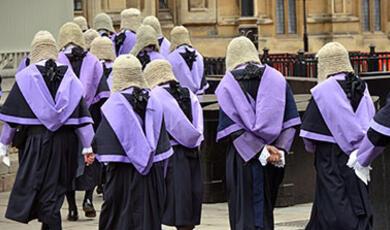Press release: Do We Need Barristers?

“There is no sensible reason for a split profession”
“The lines that are drawn between the two professions don’t make a great deal of sense in the modern world”
The Bar first required a University degree in 1975
Embargo: Thursday 2 Feb 7pm
I would like to invite you to a lecture by Professor Leslie Thomas KC, Do We Need Barristers? In this lecture, Professor Thomas will discuss how our legal profession – which splits solicitors and barristers - differs from other jurisdictions practising law, and whether this split is worthwhile, or an accident of history that should be corrected. Along the way, he explores the historic strong class divide between barristers, attorneys and solicitors. He will discuss the advantages and disadvantages of a system where barristers tend to be self-employed rather than working for a company.
Professor Thomas will say: “Barristers and solicitor-advocates have a monopoly on rights of audience in the Crown Court, High Court, Court of Appeal and Supreme Court, but not in the magistrates’ court or the County Court. We’ve already looked at the historical origins of this distinction, but it doesn’t make a great deal of sense in the modern world. After all, the same skills are required to conduct effective advocacy in an inferior court and in a superior court. If solicitors can be trusted to carry out advocacy in some courts, why not all of them? It’s no answer to say that the magistrates’ court and the County Court tend to deal with less serious cases. The County Court now routinely deals with a lot of high-value civil cases, as well as high-stakes litigation such as possession claims, where a person is at risk of being evicted from their home. The magistrates’ court includes the Youth Court, where children can be tried for relatively serious offences. And solicitors can also carry out advocacy in tribunals, and some tribunal hearings are of immense importance to the individual. For instance, a tribunal hearing in an asylum case is literally a matter of life and death.”
“There is in principle no sensible reason for a split profession,” Professor Thomas will say, “The separation between solicitors and barristers exists mainly for historical reasons. The lines that are drawn between the two professions don’t make a great deal of sense in the modern world. And the structure of the Bar, where most barristers are self-employed, creates a lot of avoidable difficulties. It is true that barristers often bring significant benefits to our cases, due to our specialist skill in advocacy and our independence. Similarly, it is true that solicitors often have skills and experience that most barristers do not. But this does not necessarily require a rigid separation between the two professions, nor does it justify the current arbitrary limits on what each can do.”
Immediate change, however, would be “very difficult and disruptive”
“That said, I’m not necessarily calling for an immediate change. It would be very difficult and disruptive to fuse the English legal professions overnight. And we also need to recognise that the structure of the legal profession does not exist in a political vacuum. We are having this conversation against the backdrop of the systematic underfunding of legal aid over the past two decades. Many of the financial pressures on the self-employed Bar, and indeed the financial pressures on solicitors’ firms, are caused by the current parlous state of legal aid. The Legal Aid, Sentencing and Punishment of Offenders Act 2012, which radically reduced the scope of legal aid, was a huge blow to the legal profession and to the integrity of the legal system, from which it has never recovered. Whether we have a split profession or a fused one, it is essential that it be funded properly.”
“The legal distinctions between what solicitors and barristers may do have already been significantly weakened in recent decades. That process should continue. But this should happen alongside an immediate increase in legal aid rates, the repeal of the 2012 Act and a restoration of the full scope of legal aid, and a commitment to fund the administration of justice properly.”
ENDS
Notes to Editors
You can sign up to watch the hybrid lecture online or in person; or email us for an embargoed transcript or speak to Professor Thomas: l.graves@gresham.ac.uk / 07799 738 439


 Login
Login





